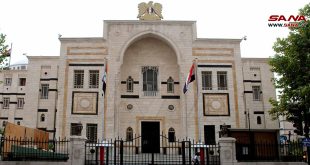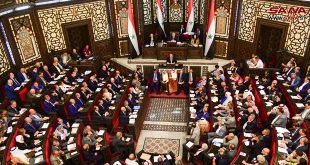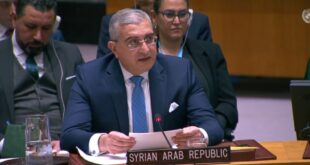Hanoi, SANA –Meetings of the 132nd Assembly of the Inter-Parliamentary Union (IPU) opened Saturday in the Vietnamese capital Hanoi, with the participation of Syria.
During these meetings, a number of parliament speakers will be discussing the role of parliamentarians in practically contributing to achieving development and establishing stability and peace in the world.
In a speech during a hearing session of the Middle East Committee, Speaker of the People’s Assembly Mohammad Jihad al-Laham, who is heading the Syrian delegation to the meetings, spoke of two main tracks concerning the current situation in the Middle East: the first is related to the Israeli occupation of Arab territories, while the other concerns the phenomenon of terrorism that is widely spreading in the Middle East region and becoming an international and regional threat.
Al-Laham called on the world parliaments to press Israel to end its occupation of Arab territories, including the Syrian Golan, considering this occupation as the root of chaos, terrorism, and tensions in the region.
Ending this occupation would contribute to the restoration of security and stability in the Middle East, he said.
As for the other track, al-Laham said that terrorism began sweeping across the Middle East four years ago under Western and regional support and under the slogan “Arab spring,” bringing untold miseries to the Arab people, and only now is the world becoming aware of the threats posed by terrorism, yet international response remains limited and shackled by erroneous policies.
He said that what is being carried out under the pretext of “training moderate opposition” in Turkey and Jordan with support from the U.S., France, Britain, Saudi Arabia, and Qatar, is a form of supporting terrorism and a blatant violation of international law.
Al-Laham called for a firm stance and exerting pressure on the states and governments to work seriously within an international strategy to fight terrorism.
This goal, he said, demands stopping the flow of foreign fighters across borders and cooperating with the countries suffering from terrorism, on top being Syria and Iraq.
This is the only way to eliminate this “dangerous cancerous phenomenon” after it swept the Middle East region four years ago, being supported by western and regional sides, and to whose growing danger the world woke up only too late, the Speaker added.
Earlier, al-Laham took part in the consultative meeting of the Islamic Group and Arab Group, during which member of the People’s Assembly Fadia Deeb, along with two MPs from Bahrain and Iraq, were named as representatives of the Arab Group to the office of the IPU Standing Committee on Democracy and Human Rights.
On a relative note, People’s Assembly member Maria Saadeh said in a speech at a session for parliamentary women on cyber warfare that while cyberspace is a wide venue for knowledge and information, it also represents an environment for breeding conflict, extremism, and terrorism, with both terrorist organizations and the states sponsoring them waging cyber terrorism against the Syrian society and exploiting the web to spread extremism among youth.
She also noted that certain states were not content to impose economic sanctions on Syria in clear violation of human rights in the UN charter, but also blocked the Syrian people’s access to sites and software, which impedes their potential for growth and development.
Qabas / H. Said / Hazem Sabbagh
 Syrian Arab News Agency S A N A
Syrian Arab News Agency S A N A




